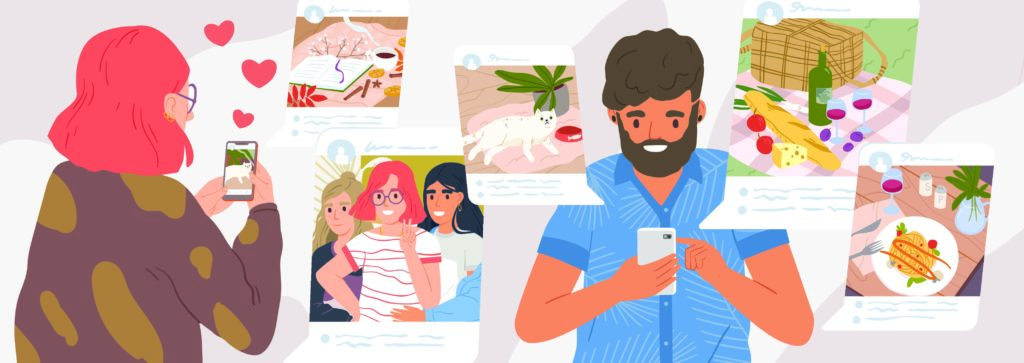How Does Social Media Hook You In?
Social Media Addiction: A Sad Reality
Dopamine-fueled, looping social media feedback craves? Tapping on the same neural architecture that excites our brains when casino gambling, hard sports betting or cocaine binging? Baiting and capitalizing on the basic human fear of missing out (FOMO)? The rushing pangs of panic when we believe we have lost, even misplaced, our cell phone?
The direct and conniving realities set forth by these questions cannot any more come as a surprise to anyone who has any connection to the ubiquitous social media universe around us. Consider this urban term, coined in our very 21st Century: phantom cell phone buzzing. Defined as the sensation of our cell buzzing inside our jackets, handbags or pant pockets when there is nothing there. It’s uncanny… but true.
All are symptoms of a worldwide paradigm change, otherwise defined as a veritable addiction to social media communication… the organic evolution of the original Internet Addiction term, first minted in 1996.
Consider these facts:
Statista reported in 2020, following a study of the daily social media usage worldwide from 2012 to 2019, that the average time spent on our mobile phones writing, swiping and tapping up and down is 135 minutes in this period. In the last two years, numbers are up: 142 minutes in 2018 and 144 minutes in 2019. Predictably, 90% of this time is spent on social networking and exchanges. Hooked to the ever-elusive, ‘magic-performing’ algorithm of myriad platforms and apps, namely Facebook, Instagram, Snapchat, Tik Tok, Google… you know the score. Some other reports have this number at 2-4 hours daily, with the Filipinos beating all know tracked records at a whooping 3 hours and 35 minutes on social media per day.
Dopamine is both a hormone and a neurotransmitter. Although pop culture often paints dopamine as the chemical of pleasure, the most advanced pharmacology studies have highlighted its motivational salience. What does this mean? Dopamine triggers a human being’s desirability or disinterest in an outcome, setting in motion our behavior in favor or against said result.
There are 4 main dopamine ‘pathways’ in our brains. These are basically connecting channels for our neurotransmitters. Social platforms capitalize on 3 of these dopamine-fueled reward pathways, which are proven dysfunctional or broken. Social media addiction exploits reward prediction error (RPE) encoding, introducing random reward schedules that keep us hooked to the possibility of positive social interactions. If checking for these rewards is made easy (which t is), then dopamine-offsetting behaviors become habits, and ultimately addictions.
Social media addiction studies were once rare, but are now entering our radars. From Harvard University’s Trevor Haynes research and literature on the effects of Facebook likes and other social media notifications, to U-Penn’s study on FOMO and the far-reaching findings of Turkish Mehmet Akif Ersoy University’s research article on Social Media Addiction and Dopamine Driven Feedback, neurological findings and psychiatric tests prove how social media users present biological and psychological symptoms in line with alcohol, cigarette and drug addicts.
Sources:
https://www.statista.com/statistics/433871/daily-social-media-usage-worldwide/
https://now.northropgrumman.com/this-is-your-brain-on-instagram-effects-of-social-media-on-the-brain/
http://sitn.hms.harvard.edu/flash/2018/dopamine-smartphones-battle-time/
https://dergipark.org.tr/tr/download/article-file/607734
https://en.wikipedia.org/wiki/Dopamine


